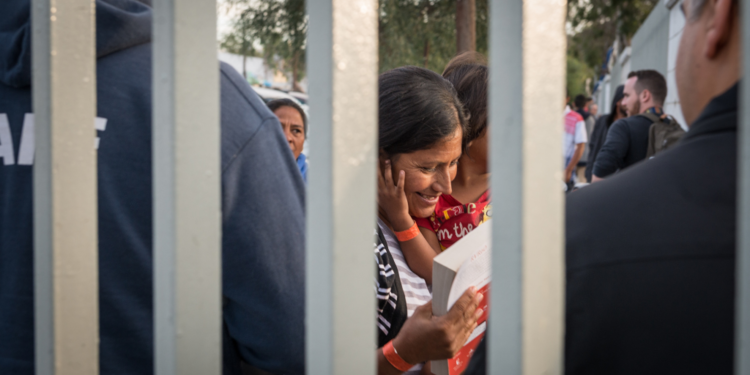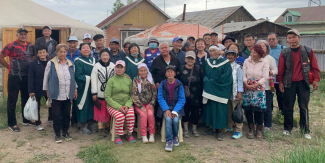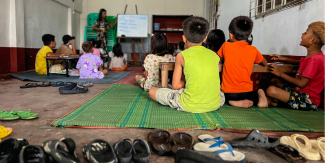Note: This article was originally published in 2016. All facts, figures, and titles were accurate to the best of our knowledge at that time but may have since changed.

We cannot ignore people whose lives are in transition due to circumstances beyond their control. What would Jesus do?
What will you do when you discover that your new neighbor speaks a language unlike yours, dresses “strangely,” has a different skin color, cooks odd food, goes to another kind of prayer center, and is just not what you are accustomed to? Such a scenario is likely to occur these days, and we must ask ourselves, How do we, as the body of Christ, respond?
According to the United Nations, in the past 15 years migration has increased more than 41 percent. Within this migrating population there is an astronomical increase in refugees. Currently there are nearly 60 million men, women, and children in the world escaping wars, persecution, and other dangers. They usually leave their homes without possessions. They’re deeply traumatized by the loss of the life they once had, coupled with an unknown future. Such monumental cultural changes may raise questions in people’s minds, such as Will these immigrants take my job? Will they try to convert us to their religious beliefs? How will their presence affect my community, my children? And of course, this one: Could they be terrorists planted to destroy our comfortable and peaceful lives?
Such questions are based on stereotypes, misinformation, or lack of information about people from various cultures. It’s easy to form opinions based on media reports and become fearful or angry because of our lack of understanding of those who are not like us. I remember speaking in a church about God changing the lives of people we worked with in the Middle East. During a question-and-answer time, a man expressed how much he appreciated our “stories.” But he added, “I can’t say that I believe what you have told us is actually true. I am afraid and angry at those people so I don’t trust them nor do I believe they can be changed by Christ.” Human nature causes us to look first after ourselves and our own people before considering others. But we need to see immigrants and refugees through the eyes of Christ and not be blinded by our own fear and distrust.

Hospitality to Strangers
The Bible gives clear guidance about our responses to others. In Hebrews 13:2 we’re taught, “Do not forget to show hospitality to strangers, for by so doing some people have shown hospitality to angels without knowing it.” When we study the life of Jesus we see that “He came unto His own,” caring for them. But He did not fear people who were different.
A good example is found in John 4, when Jesus met the Samaritan woman at Jacob’s well. The disciples were not comfortable there because the Samaritans and Jew were enemies. But Jesus was comfortable. He saw a broken person and gave her the hope that He offers us all. In Matthew 25:35 Jesus taught His disciples that whatever they did for a stranger they were doing unto Him. “I was hungry and you gave me something to eat, I was thirsty and you gave me something to drink, I was a stranger and you invited me in.” God commanded His people to provide hospitality and shelter to the foreigner. “When an alien lives with you in your land, do not mistreat him. The alien living with you must be treated as one of your native-born. Love him as yourself, for you were aliens in Egypt, I am the Lord your God.” (Leviticus 19:33-34).
In the New Testament, He even tells us that we should love our enemies. This is what it means to live out the gospel. When we consider these words, do we recognize Him in the faces of those strangers who have moved into our neighborhood? Do we invite them in? Do we treat them as if “native born”?

Outreach and Compassion
When my family first moved overseas to a very different culture, at times we had strong feelings of lostness and desperation. We needed someone to knock on our door and welcome us; to offer to assist us to find the best places to shop; to introduce us to our other neighbors and to tell us the best way to get around town. They did come, and it made our adjustments much easier and made us feel that we might possibly find a community of which we could be a part. Wonderful friendships grew out of their gifts of hospitality. Yet because of threats and acts of terror happening around the world, it is not uncommon to hear some Christians speak against immigration. Some strongly oppose accepting refugees, believing that terrorists might be infiltrating programs to receive the migrants.
The Church of the Nazarene in the Middle East offers a powerful example of outreach and compassion as an alternative to fear and risk-aversion. Our churches in Jordan and Lebanon have a unique position as their countries are absorbing approximately 1,400,000 and 2,372,000 refugees respectively. Nazarenes are welcoming and serving the refugees that are fleeing from Syria and Iraq. The churches are providing food, blankets and clothing, and conducting special church services which are full with many who are from non-Christian backgrounds. The Nazarene schools are also providing educational opportunities for the children.
“When asked if they are afraid that terrorists might be in the groups that come, the pastors respond that they don’t even consider that. All they know is that the people are hungry, possessing only the clothes on their backs, and have broken lives.”
It is amazing to see the desire to serve but also the respect shown to those who are so different from them. They believe that God is bringing people to them to find new life through His grace. Immigrants and refugees are moving all over the world. It is important that Christians and Nazarenes ask, “Are we as hospitable and open to these new neighbors?”

Gentleness and Respect
It doesn’t matter from where immigrants and refugees come—this word from Peter applies to all the followers of Christ: “In your hearts set apart Christ as Lord. Always be prepared to give an answer to everyone who asks you to give the reason for the hope that you have. But do this with gentleness and respect” (1 Peter 3:5). This is where we should start if we want to live out the life of Jesus in front of the immigrant or the refugee. Do all “with gentleness and respect.” We must remember that our priority is to live out a biblical culture, and not only the culture that we call our own. This will involve listening to people as they tell their stories; asking people to share of their cultures, customs, and histories; accepting that all are made in the image of God.
Being part of the body of Christ is always going to include building relationships with people who live their lives differently than we do. This is done by putting ourselves in situations and locations where we will meet people of other cultures, and building bridges, not fences. Sometimes we feel we lack the tools to build relationships, but we can always search for small connections. Children are great models and can create common ground. Even before they can speak one another’s language, they have a way of communicating and being friends. Dare to invite them to bring their children to play with your own. Don’t be afraid to have them in your home. Your home and friendship might be the place they find healing and acceptance. It can be a place of speaking the truth of Christ into their lives.
Most people want to be asked questions about their lives and their cultures. Questions should be thoughtful and sincere. Listening to people also helps to realize there is a real person speaking and not someone reduced to stereotypes in the media. Be a student and curious about what these people believe and how they live their lives. They want someone who will try to understand the struggles they face. Standing against discrimination and injustice will also demonstrate that you care enough to take a risk for them. Getting to know people will help one understand what others value most. For example, some cultures value families, respect and care for the elderly, hospitality, education, or religion. It is also important to show an interest in their holy days and holidays and invite them to be a part of your celebrations even though they may not be Christians.
Our neighbors from various religious groups always enjoyed visiting us during Christmas and Easter to see our decorations and hear the reasons we celebrate. What an opportunity to share Christ! In discussing issues, one should not be surprised at the subjects that are brought forward. It is very important to not criticize the other’s religion. Be prepared to admit the mistakes and crimes of Christians in the past and present. Don’t be impatient or defensive if the discussion arises about political and social issues.
Distinguish between what is the most important in your religious beliefs and what is less important—some of our convictions may come from our own cultures and not from the Bible. Don’t forget the power of personal testimony. People will not forget your kindness, your help and acceptance of them. Demonstrate your faith. Embrace the role that Christ has for you to live as you serve Him by serving others.
Lindell Browning is a retired missionary who served in the
Eastern Mediterranean area.
Reprinted with permission from Holiness Today, March/April 2016






Add new comment